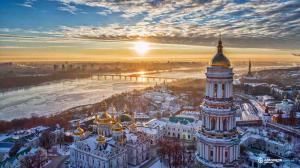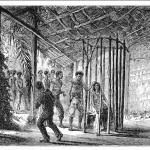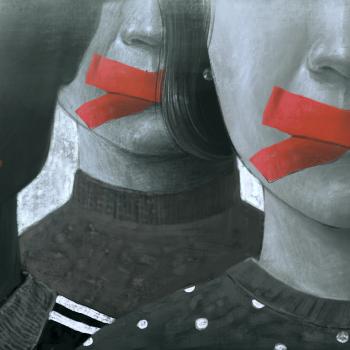 War has returned to Europe after a long, dreamy sabbatical. Russia’s troops and tanks are advancing toward Kiev, the capital city of Ukraine and the Ur-heimat of Slavic Christendom. Apartment buildings are burning; middle-class inhabitants are refugees, homeless, or — in too many cases — dead; and newspaper headlines last Thursday simply said “War in Europe” as if it were 1939. All of this supports that sinking feeling I got in early January that 2022 wasn’t going to herald any return to normal that we all yearned for. It’s even possible that what’s going on in Ukraine isn’t going to stay contained there. I hope I’m wrong, but the “truly massive general crisis” that historian and statesman Philip Zelikow predicted at the Aspen Ideas Festival in 2017 doesn’t seem so far-fetched right now.
War has returned to Europe after a long, dreamy sabbatical. Russia’s troops and tanks are advancing toward Kiev, the capital city of Ukraine and the Ur-heimat of Slavic Christendom. Apartment buildings are burning; middle-class inhabitants are refugees, homeless, or — in too many cases — dead; and newspaper headlines last Thursday simply said “War in Europe” as if it were 1939. All of this supports that sinking feeling I got in early January that 2022 wasn’t going to herald any return to normal that we all yearned for. It’s even possible that what’s going on in Ukraine isn’t going to stay contained there. I hope I’m wrong, but the “truly massive general crisis” that historian and statesman Philip Zelikow predicted at the Aspen Ideas Festival in 2017 doesn’t seem so far-fetched right now.
Way back in 2016, when Donald Trump won the U.S. presidency, I was as apoplectic as all the rest of the credentialed elite that I thought I belonged to. I wrote here at Patheos that Trump’s election was going to bring war — real war, warfare between rival nation-states with standing armies, not mountain-dwelling insurgents pestering imperial occupiers — back into the world. Trump was so unstable, so impulsive. How could his election to the most powerful office in the world not lead to war?
I was wrong. Sort of.
Trump, who it turned out was and is just as personally unhinged as we otherwise clueless credentialed elites feared, nevertheless presided over the first administration since Jimmy Carter that avoided starting any new military campaigns. His administration made some remarkable diplomatic advancements in the Middle East, even though it alienated most of our core allies in Europe (more or less on purpose). All in all, it was messy, but World War III it wasn’t.
So, my bad.
But in another sense, my gut prediction was the end of the long postwar peace, and only a few short years later, here we are. I now see Donald Trump as a harbinger, not a cause. The election of someone like him to the presidency of the world’s premier democracy was a credible sign that the post-World War II era of liberalism, free trade, and a US-led world order was indeed coming to end. With Russia’s invasion of Ukraine this week, that intuition seems vindicated.
The Pax Americana: Why There Was Peace
Warfare really did decline to a remarkable degree over the latter half of the 20th century. In fact, by some methods of accounting, the 75-year period since the end of hostilities in Europe and the Pacific marks one of the most peaceful periods in history. Yes, wars broke out here and there: Vietnam, the Balkans, the Levant. But these fights were mostly regional and contained. More importantly, the world population was growing dramatically even as military violence was becoming less frequent. As a proportion of the populace, then, fewer people died from organized, armed violence during the past three-quarters of a century than probably any comparable time humanity has ever known.
Intellectuals have spilled lots of ink over the reasons for this. Steven Pinker argued in The Better Angels of Our Nature that the spread of Enlightenment values, the political empowerment of women, and the rise of internationalism explain much of this change. Essentially, Pinker wrote, we’ve been civilizing or domesticating ourselves for centuries, imposing penalties on violent behavior at home and finding alternatives to war abroad. As a result, murder rates have been declining in Western countries (at a trend level) since the early Middle Ages.
There’s probably something to Pinker’s Whiggish view of things. Culture really can change, and evolving social mores can discourage antisocial behavior. Two hundred years ago, Aaron Burr, rascal and sitting vice-president, killed Founding Father Alexander Hamilton in a duel. But in succeeding decades, dueling fell out of favor. The growing power of the state, which jealously tried to prevent private entities from using violence, helped drive it to extinction, and so did public disgust with violence after the Civil War.
So things can change. And following the Axis powers’ defeat in World War II and the subsequent rise of organized internationalism, all kinds of violence really did decline worldwide. The last 75 years have been unusually, even unprecedentedly, peaceful, as far as the general barbarity of the human species goes.
But if you’ve read this blog before, you know that I think that most observers tend to miss one of the most important reasons for this: the United States. The past three-quarters of a century was, quite simply, the Pax Americana. The US was so completely dominant, politically, economically, and militarily, and so willing to use both hard and soft power to get what it wanted, that large-scale conventional war between nation-states became more or less impossible.
At the same time, the United Nations and other liberal, international institutions would have been completely powerless without the United States, which is by far the largest financial contributor to the UN and most similar institutions, such as the World Bank. You might even realistically call such institutions extensions of American power. (And many have.)
Pride Goeth Before the Fall
So the US spearheaded a new global order after World War, using international institutions as levers to get what it wanted. And what did the United States want? It wanted orderly oceans and peaceful economies, so that it could preside over a worldwide system of ever-growing liberal trade with itself at the center. It didn’t want big wars, because war is bad for business. War closes down ports and shutters factories or diverts manufacturing to military uses. Lucrative foreign markets become inaccessible. And factories that are producing tanks aren’t producing cars, laptops, or consumer trinkets.
As long as it was the undisputed center of the “free world,” America could enforce this capitalist vision pretty effectively, at least on the two-thirds of the planet’s surface not controlled by Communists. We used our immense financial and political influence in tandem with the threat of our overwhelming military power to make sure that any serious threat to the internationalist vision was neutralized before it got too big.
Once the Soviet Union collapsed, the U.S. enjoyed a brief, exhilarating window of about 20 years where it believed that it really could shepherd the entire world, including the former Soviet bloc, into its utopian future of neoliberal free trade underwritten by American military and financial hegemony.
But our new “hyperpower” status led us into naïve optimism and a dangerously grandiose sense of our own destiny. That’s why we opened up normalized trade relationships with China: we overconfidently thought it would turn them into nice liberal capitalists like us. It’s also why we invaded Iraq, illegally and unjustifiably: our fearless then-leader, George W. Bush, thought he could single-handedly turn Iraq into a liberal democracy, then integrate it into the global capitalist system.
Well, China is now close to becoming the world’s premier economy, with absolutely no signs of becoming a liberal democracy — quite the opposite, in fact. And the invasion of Iraq, which will probably go down as one of the most catastrophic unforced mistakes in the entire history of world empires, unleashed a hellish reconfiguration of the Middle East that spawned countless new terrorist groups, briefly gave rise to a violent, beheading-crazed pseudo-Caliphate under ISIS, and empowered a lot of violent dictators in its wake. The whole fiasco permanently damaged America’s image with both allies and enemies, undermining the credibility and prestige that was crucial for US soft power.
Then came the global financial crisis of 2008, which sprang out of willful (and still unpunished) misbehavior by American financial elites and nearly cratered the entire world’s economy. The troubles of the late 2010s followed, with the rise of Anglophone economic nationalism, the election of Donald Trump — who clearly couldn’t care less about the liberal global system — and the extreme ideological counterreactions of spooked progressive elites. Many other countries, looking in at the mess we Americans were making of our own society, quite naturally began to edge away. The American-led global liberal system was losing its sheen. The disastrously botched evacuation from Afghanistan last summer — which may or may not end up being our generation’s Suez Canal moment — didn’t help.
In short, the Pax Americana — our postwar ability to enforce an American global vision of peace, capitalism, and liberal democracy — has been crumbling for a while. But although it brought plenty of problems, both domestically and worldwide, the Pax did decrease the prevalence of international war. For more than seven decades, it was semi-possible to dream of a Star Trek–like future without war, where the world would be interlinked through trade and international institutions, enjoying endless technological and social progress. As the Pax Americana recedes into history, this vision of the future is itself becoming a thing of the past.
A Return of Realism
Putin’s invasion of Ukraine is the cue that the postwar liberal era is now, in some way, definitively over. Even if the stalwart Ukrainian defense effort is somehow successful and Putin is forced to scurry home in shame, the return of large-scale land warfare to Europe is a revelation that can’t be stuffed back in the memory hole. Aris Roussinous writes that
For all of Europe, from Hungary to Britain, the war in Ukraine must come as a wake-up call. The good times are over, and a return to conflict between the great powers on our home continent is now more likely than it has been in a generation.
As Roussinous sees it, Europe’s days of being essentially a tourist’s playground, insulated from serious existential threats, are probably over. Re-armament is a necessity. Indeed, the European Union has already broken with longstanding precedent and will purchase and coordinate the shipment of arms to Ukraine. Military spending and a focus on defense are going to occupy European countries in a way they haven’t in decades. The Pax Americana gave us the illusion that countries just don’t invade other countries anymore, that imperialist land grabs are a thing of the benighted past. But even if this particular war fizzles out tomorrow, no one is going to forget its gut-punch lesson that, actually, countries really can invade others, and peace isn’t guaranteed.
The Religious Angle
As the Pax Americana comes to its end (however long that ultimately takes), the future of much that accompanied it is also in question. United Nations–style secularism, for example. According to political scientists Ron Inglehart and Pippa Norris, the postwar era’s widespread peace and prosperity enabled Western peoples to focus on post-materialist values, including cosmopolitanism and liberalism, which are strongly tied with secularism.
In Inglehart and Norris’s thinking, post-materialist values are what people turn to when they don’t need to worry about survival. When countries experience catastrophes or war, post-materialism usually wanes (if only temporarily). Hence, if the Pax Americana really is ending, it likely means that many people who otherwise would have had upper middle–class, post-materialist values may become newly concerned with materialist concerns: that is, with survival. And traditionalism and religiosity are (ironically, given religions’ emphasis on the spiritual) essentially functions of material- and survival-oriented values.
Finally, there’s the fact that Putin’s attempt to conquer Ukraine is partly driven by a very real religious obsession with Kiev as the spiritual homeland of the Russian Orthodox Church and, by implication, the Russian people. It was in Kiev that, in 988, Prince Vladimir the Great converted to Christianity, bringing the Kievan Rus’ people with him. Putin may be a madman who’s willing to risk nuclear armageddon for the sake of imperialism, but he’s a madman with a complex cultural and religious backstory to his ambitions. Putin’s militant Orthodoxy is another reminder that the secular assumptions of the American global order aren’t actually that useful for understanding or predicting events in the post-Pax era — or, really, in any era.
Of course, the secular West may at first have a hard time grokking that most of the rest of the world is absolutely capable of being militarily animated by fervent religious passions. During the Pax Americana, the re-establishment of the Caliphate or the recovery of the ancestral fount of Holy Orthodoxy just seemed like yesterday’s concerns. But we Westerners were never really immune to these passions ourselves. It wasn’t so long ago that the UK’s reconquest of Jerusalem for Christendom gave the British public a giant morale boost in the thick of a world war. And today, Western leaders are consolidating under a set of new, quasi-religious beliefs and rituals that commentator Wesley Yang calls a “successor ideology.”
At the end of the postwar liberal era, then, even secular liberalism itself is becoming religious. Surveying the Ukraine emergency, Yascha Mounk writes:
I am not a religious man. But in these painful hours, I have found it impossible to resist a secular prayer:
May God be kind to the Ukrainian people.
May God be kind to all of us.
For there, but for the grace of history, go we.
___
Edit, 3/3/22: Typo/wording error corrected in second paragraph. These posts never seem to get through without a least a couple of mistakes in the first version.












